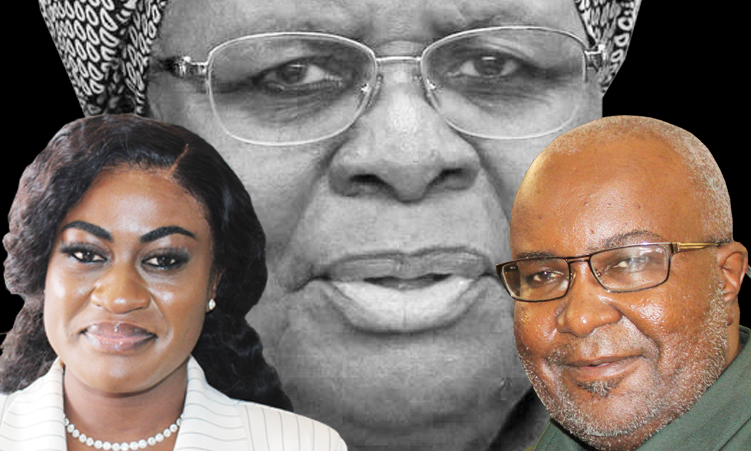History is an endless story. It is told from the victor’s angle. It comes from the victim’s end. Put together, all the pieces shape up history.
For a long time now, Namibia’s history was told from the victor’s angle. And it begged to be heard from the other end.
With this in mind, 18 people – educationists, historians, politicians, and many others rewrote Namibia’s history from the eyes and the ears of the victims.
Titled ‘Reviewing Resistance in Namibian History’, the book carries essays written by Ellen Ndeshi Namhila, Werner Hillebrecht, Shampapi Shiremo, Petrus Angula Mbenzi, Anette Hoffman, Kletus Muhena Likuwa, Dag Henrichsen, Bennet Kangumu Kangumu, Aaron Nambadi, Timoteus Mashuna, Jeremy Silvester, Martha Akawa, Lovisa Tegelela Nampala, Herbert Kandjimi Karapo, Reinhar Kossler, Pekka Peltola, Helvi Inotila Elago, Andre du Pisani and Gilbert Likando.
The book covers various topics among them the issue of heroes in the essay Hendrik Witbooi and Samuel Maharero: The ambiguity of Heroes written by Hillebrecht; Angula’s Revolutionary Songs as a Response to Colonialism in Namibia; The Caprivi African National Union 1962-1964 done by Kangumu Kangumu; The Kavango Legislative Council from Nambadi; Silvester and Akawa’s Waking the Dead: Civilian Casualties in the Namibian Liberation Struggle; Du Pisani’s Colonial Monuments – Heritage or Heresay? As well as Likando’s Heritage Education in the School Curriculum: A Critical Reflection.
Hillebrecht, an activist, author and researcher whose works are kept at the National Archives in Namibia, looks at Hendrik Witbooi and Samuel Maharero’s roles in the history of the country.
Both Witbooi and Maharero are familiar icons whose backgrounds are similar in many more ways than one.
Witbooi rebelled against his father Kap-tein Moses Witbooi while Maharero violated traditional rules to take over power. Both led their people against the German might – Witbooi was shot in battle in 1905 and buried secretly near Vaalgras while Maharero fled to Bechuanaland (now Botswana) where he died 18 years later.
Above all, they fought each other or alongside each other against the Germans. And today they are both remembered by their people.
In his essay, Hille-brecht argues that although Witbooi has no statue in his honour, his life has attributes of a hero.
According to Hillebrecht, Witbooi is remembered nationally by an empty grave at Heroes Acre and a memorial stone at Gibeon.
On one hand, although Maharero did not leave anything much in written form, Witbooi did. In these papers, Hillebrecht says Witbooi was prophetic in foretelling the ways of colonialism. Now kept under Unesco’s Memory of the World inventory, Witbooi’s papers have been published in four books. In 1890, Witbooi wrote to Maharero Tjamuaha, Samuel’s father, after he had entered into a protection agreement with Germans that:
“You will eternally regret that you have given your land and your rights to rule into the hands of White men. For this war between us is not nearly as heavy a burden as you seem to have thought when you did this momentous thing.”
In minutes recorded during a meeting with the German commander Curt von Francois in 1892, Witbooi said:
“If a danger threatens one of us which he feels he cannot meet on his own, then he can call upon a brother or brothers among the Red chiefs, saying: Come, brothers, let us together oppose this danger which threatens to invade our Africa, for we are one in colour and custom, and this Africa is ours. For the fact that we various Red chiefs occupy our various realms and home grounds is but a lesser division of the one Africa.”
On the other hand, Maharero sided with the Germans until when he realised that he would lose his land in the end. Threatened as such, he signed an agreement with Witbooi in 1892 when he wrote to Witbooi saying: “laat elke plaats kan maar Natie zelf wonen, en laat maar de machtigen en sterksten Natie voor ons maar in onze grond met kracht uitstoten (The most urgent task for me just now is to ensure that all of our land is occupied by our nation, and that we push this powerful and strong nation back from our country with energy and force, lest we lost it by default.)
The lives of both Witbooi and Maharero demonstrate that a hero had to do what is best for his people. This, according to Hillebrecht, could explain why the two fought each other, supported the Germans against each other and then teamed up against the Germans.
Even their decedents, chief Hosea Kutako and kaptein David Witbooi as well as Hendrik Witbooi carried on the torch when they petitioned the United Nations on behalf of their country.
“One cannot say they never wavered in fighting colonialism. Yet they did what they did according to their knowledge and understanding of the circumstances. There can be no doubt they deserve their place of honour,” concludes Hillebrecht.
A good book for researchers and students of history.
Stay informed with The Namibian – your source for credible journalism. Get in-depth reporting and opinions for
only N$85 a month. Invest in journalism, invest in democracy –
Subscribe Now!










